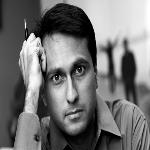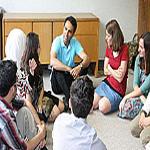30 August 2010

Photo: Nubar Alexanian
A Rhodes Scholar, Eboo Patel established Interfaith Youth Core, a volunteer organization that brings young people from different religions together.
Eboo Patel says he has always been interested in the diversity of religious experience.
He was born in 1975 to Muslim Indian parents, and emigrated with them from Bombay to Chicago when he was an infant. Patel grew up with friends of different religious backgrounds.
By the time he was 13 he was asking himself, "What does it mean to be a Muslim, when your friends are a Hindu, a Jew, a Nigerian evangelical, a Mormon, a Lutheran, a Catholic?"
As he became more serious about his religion, Islam, and as his friends became more serious about their religions, Patel says they started to have a conversation about faith "in a higher-level way."
Conversation about faith
Patel recounts that experience in his 2007 memoir, "Acts of Faith: The Story of an American Muslim, the Struggle for the Soul of a Generation."
His idea for an Interfaith Youth Core, inspired by other service organizations like the Peace Corps, began to develop at Oxford University in England, where, as a Rhodes Scholar, Patel received a doctorate in the sociology of religion.
"The basic idea of the Interfaith Youth Core is young people from different religions should be volunteering together, cleaning rivers, tutoring children, building houses. And they should use that as an entre into having a conversation about how their different religions inspire them to serve others," Patel says.
The Core's first projects were conducted outside of the United States. Patel learned the methodology and theory of interfaith work by practicing it in South Africa and Kenya and Sri Lanka and India. He studied the Sarvodaya Shramadana movement in Sri Lanka, learned about Ubuntu from African traditionalists in South Africa, and helped run an interfaith service learning project with Habitat for Humanity in Hyderabad, India.

Interfaith Youth Core
President Barack Obama appointed Eboo Patel to the White House Advisory Council on Faith-based and Neighborhood Partnerships.A permanent home
In 2002, he returned to Chicago, and with a grant from the Ford Foundation, established a permanent home base for the Interfaith Youth Core.
He reminds people that core is spelled as it is, "because we in Chicago see ourselves as simply the core of a growing global movement."
In 2006, the Interfaith Youth Core, which has worked with refugees and the homeless in Chicago, did go global, participating in an exchange with young interfaith leaders in Jordan. Since then, IFYC members and alumni have traveled to Indonesia, Kazakhstan, Mongolia, the Philippines, and elsewhere to share their experiences. They have also conducted training workshops in the United Kingdom, Qatar, throughout Europe, and in India.
"People are realizing that this issue of interfaith cooperation, it matters in a huge way," Patel says.
Among those realize that is President Barack Obama, who appointed Patel to the White House Advisory Council on Faith-based and Neighborhood Partnerships. And the president is not alone.
Patel was named one of America's Best Leaders of 2009 by the weekly news magazine "U.S. News and World Report." That year he was also chosen as one of five "future policy leaders to watch" by Harvard's Kennedy School review, and was honored with the Roosevelt Institute's Freedom of Worship Medal.
Religious totalitarians vs. pluralists
Patel believes that the most divisive issue of the 21st century will be religion, or as he puts it, "the faith line."
"But the faith line doesn't divide Christians and Muslims, Jews and Buddhists. The faith line divides religious totalitarians and religious pluralists."
Patel defines religious totalitarians as those who condemn every religion other than their own. At their most extreme, religious totalitarians, like the suicide bombers of today, will kill anyone who doesn't share their beliefs.
On the other side, Patel says, are the religious pluralists. "The religious pluralist says, 'I deeply believe in my religious tradition, but I understand that your way of believing and belonging is right for you," he explains. "I want to cultivate a sense of understanding and cooperation. I want to figure out how you and I, Christian and Muslim, Jew and Buddhist, Baha'i and Hindu, how we can collectively serve the common good.'"